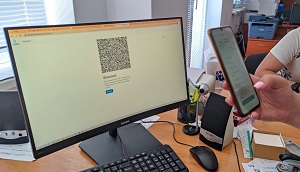by Pedro López (Gijón City Council) and Georgi Simeonov (Municipality of Peshtera)
The main aim of IMPULSE is the assessment of the use of disruptive technologies in public services. In this context, IMPULSE’s approach for a new electronic identity (eID) is being testing by 6 public administrations in 5 EU countries. Municipality of Peshtera and Gijón City Council analyse the feedback (pros and cons) from citizens who volunteered to validate the solution.
The IMPULSE solution simplifies the process of accessing public services for citizens by eliminating the need for physical documents, user IDs or passwords. With its user-friendly interface and intuitive design, citizens can effortlessly interact with public bodies, resulting in more efficient completion of administrative tasks.
By streamlining the identification process and removing the requirement for complex passwords or digital certificates, for example, IMPULSE saves citizens valuable time and effort. It expedites administrative procedures, enabling quick and convenient access to public services. Additionally, public servants also save time, which contributes to increase the efficiency of the public administrations.

Citizens can have confidence in the security of their personal information due to the high-security framework of the IMPULSE solution. It minimises the risk of identity theft and fraudulent activities, ensuring a secure environment when accessing public services.
Furthermore, IMPULSE offers improved accessibility to public services by eliminating the need for physical documents or in-person visits. This is particularly beneficial for individuals with mobility issues or those residing in remote areas, as they can easily engage with public administrations from anywhere with an Internet connection. That also implies an environmental benefit in terms of carbon fingerprint.
However, there are potential drawbacks to consider. Some individuals with limited technological skills may face challenges with the advanced digital tools utilised in the IMPULSE solution. This can result in exclusion for less technologically-proficient citizens, particularly senior citizens, who may struggle to adapt to the new system and access public services independently.

On the other hand, the digital divide among citizens may be worsen by the IMPULSE solution. Limited access to technological resources or Internet connectivity might affect the use of solutions like IMPULSE. It is important to address this disparity and ensure equal access to public services for all citizens, irrespective of technological resources or geographic location.
While the IMPULSE solution enhances security measures, privacy concerns regarding the protection of personal data may arise. Biometrics or document verification techniques based on Artificial Intelligence rely on sensitive information, requesting careful consideration of data privacy.
The success of the IMPULSE solution stems from the availability and reliability of the technical infrastructure, although users may encounter challenges in the event of system disruptions or technical glitches on the platform.
From the citizens’ perspective, the IMPULSE solution offers multiple benefits, such as a user-friendly experience, time savings, enhanced security, and improved accessibility. However, potential challenges include technological barriers, the digital divide, privacy concerns, and reliance on technical infrastructure. From our municipal service’s point of view, and based on what we have learnt from our case studies, we believe that IMPULSE will offer more pros than cons to the citizens.
